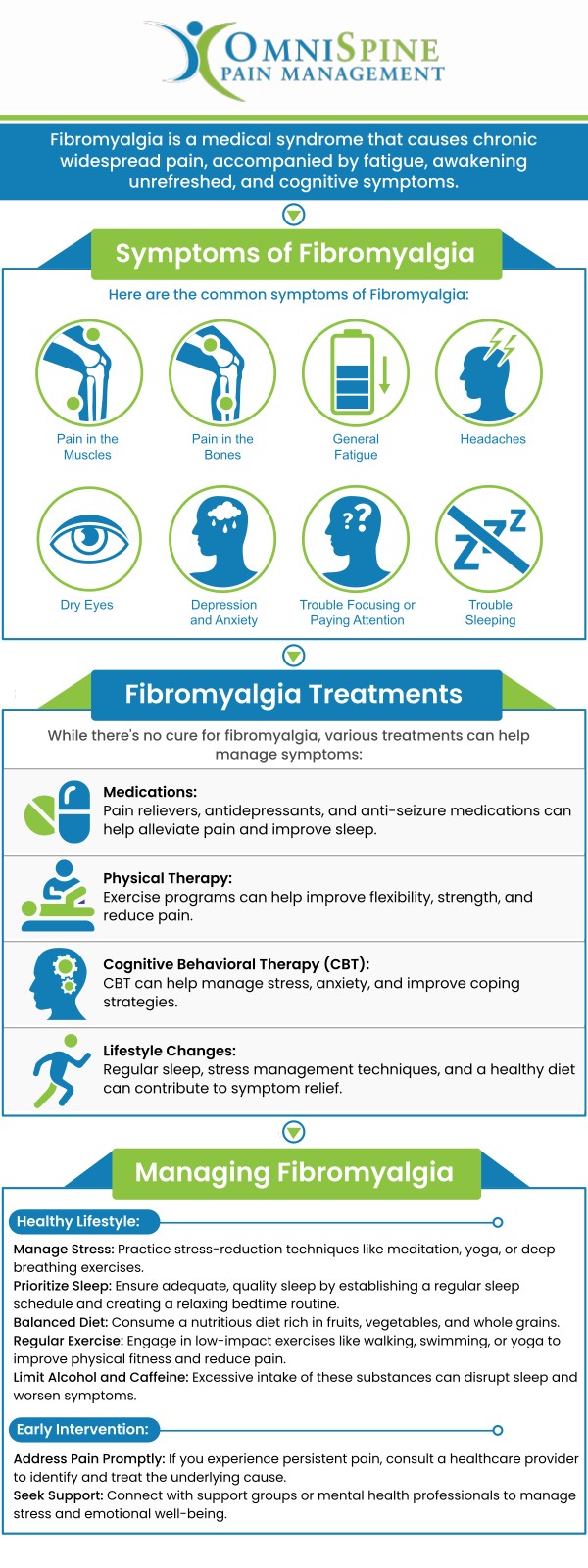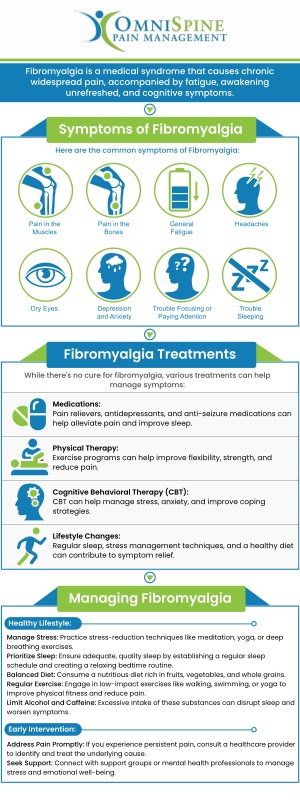Fibromyalgia Treatment Q&A
Suffering from chronic pain and fatigue? Some common symptoms of Fibromyalgia also include trouble sleeping, mood swings, and body stiffness. Talk to Dr. Andrew Morchower and his team of healthcare professionals today at OmniSpine Pain Management about treatment for fibromyalgia. For more information, contact us today or book an appointment online. Our clinics are located in Frisco, TX, Sunnyvale, TX, and Mesquite, TX.




Table of Contents:
What is fibromyalgia?
What are the symptoms of fibromyalgia?
What causes fibromyalgia?
Who is at risk for developing fibromyalgia?
Fibromyalgia is a mysterious condition that causes widespread pain throughout the body but without a single known source. The pain typically affects the musculoskeletal system and can be accompanied by additional symptoms such as fatigue and issues with sleep, memory, and mood. Symptoms can start following an event that affects the body, such as surgery, infection, physical trauma, or severe psychological stress. With other people, the symptoms can develop over time without a significant event that triggers them.
It is believed that fibromyalgia increases the body’s pain sensations by altering how the brain and spinal cord sense and acknowledge pain signals. Fibromyalgia is different for every person who suffers from it, with a variety of symptoms that can be misdiagnosed as several other conditions, making it hard to make a proper diagnosis. Pain can be experienced throughout the body, without the sufferer being able to pinpoint the exact source or location of the pain.
The most common symptom of fibromyalgia, regardless of all other symptoms, is pain. The pain of fibromyalgia can vary from day to day, and vary in its severity, but is constantly there as a dull ache. It is widespread throughout the body, meaning it affects both sides of the body as well as above and below the waist. Additional symptoms of fibromyalgia can include fatigue, despite sufferers sleeping for extended periods.
Their sleep can often be disrupted by the pain of fibromyalgia, as well as additional sleep disorders like sleep apnea and restless leg syndrome. Patients can also experience cognitive difficulties such as the ability to pay attention, concentrate, and focus on mental tasks. Additional symptoms can include irritable bowel syndrome, anxiety, depression, migraines, painful bladder syndrome, interstitial cystitis, and postural tachycardia syndrome. Symptoms of fibromyalgia can often be mistaken as symptoms of other conditions and a diagnosis of fibromyalgia is often the conclusion when all other possibilities have been ruled out.
The clear cause of fibromyalgia is not confirmed or proven; however, researchers have a few strong theories on the cause. As fibromyalgia causes widespread pain throughout the body, it is suspected that the brain and spinal cord changes in people with fibromyalgia, as the result of repeated nerve stimulation. People with fibromyalgia seem to have higher levels of specific chemicals that send pain signals to the brain, as the result of the changes in the spinal cord and brain.
The pain receptors in the brain also seem to be affected by fibromyalgia, causing the brain to be overly sensitive to sensations of pain and overreact. Why these changes happen to the brain and spinal cord is also not clear, although there are factors that seem to be common in many cases. These factors include a genetic family history of the condition, infections or illnesses that trigger the condition, and events that are physically or emotionally traumatic, such as an accident or prolonged stress.
Fibromyalgia is a tricky disorder to diagnose, due to there not being a clear-cut cause for the condition and symptoms being different from one person to the next. However, certain factors do seem to increase the likelihood of a person developing the condition. These factors include their gender, as women seem to be more commonly diagnosed than men, a family history of the condition in a close blood relative such as a sibling or parent, and the existence of other disorders such as lupus, rheumatoid arthritis, or osteoarthritis. Fibromyalgia shares symptoms with a number of other diseases and conditions and is therefore often misdiagnosed. People who are experiencing widespread pain throughout their body that isn’t responding to other treatments and has been classified as being chronic can seek out the expertise of a pain specialist. Fibromyalgia is often diagnosed through the process of elimination of other conditions that share similar symptoms. A doctor knowledgeable in pain, and fibromyalgia specifically, such as the team at OmniSpine Pain Management, can help to make the proper diagnosis and provide patients with the best treatment to help them manage their pain symptoms. For more information, call us today or visit us at a location near you in Mesquite, Sunnyvale, and Frisco TX. We serve patients from Dallas TX, Frisco TX, Mesquite TX, Sunnyvale TX, Plano TX, Garland TX, Forney TX, Cedar Hill TX, Denton TX, Balch Springs TX, and surrounding areas.
Check Out Our 5 Star Reviews






